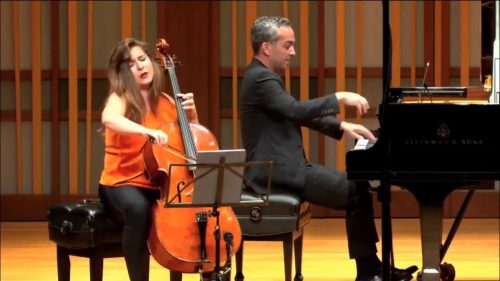 United States Beethoven: Alisa Weilerstein (cello), Inon Barnatan (piano), presented virtually by Aspen Music Festival, streaming from Baker-Baum Concert Hall at The Conrad Prebys Performing Arts Center, La Jolla, California, 26.7.2020. (HS)
United States Beethoven: Alisa Weilerstein (cello), Inon Barnatan (piano), presented virtually by Aspen Music Festival, streaming from Baker-Baum Concert Hall at The Conrad Prebys Performing Arts Center, La Jolla, California, 26.7.2020. (HS)

Beethoven – Cello Sonata in A major Op.69; Cello Sonata in D major Op.102 No.2
It’s often a performer’s superb technical ability that gets us to connect with a great piece of music. Sometimes, though, it has more to do with what the composer might have been trying to say and how the musicians interpret it. A great performance, as happened Sunday in the Aspen Music Festival’s third marquee concert in its virtual summer series, does both.
Cellist Alisa Weilerstein and pianist Inon Barnatan applied impeccable technique and a gently persuasive approach to two Beethoven sonatas in a musically compelling recital beamed live from Baker-Baum Concert Hall in La Jolla. Longtime recital partners, they have been living in a ‘pod’ at Weilerstein’s home near the venue with her husband (conductor Rafael Payare), as Barnatan gears up for his second season as music director of the La Jolla Music Society Summerfest, scheduled for streaming next month. That proximity certainly helped put them on the same page for this program.
The short (less than an hour) concert consisted of two of Beethoven’s five cello sonatas. Though the darker, denser D major carries more weight – it even ends with a fugue – it was the conversational and light-spirited A major that came off as more beguiling. At least it was for me, thanks to a memorable experience early in my regular visits to Aspen and the summer festival. In the mid-1990s, a small group of us crowded into one of the bungalow practice rooms at the old music school campus to audit a master class. Coaching a student cellist and pianist in the first movement of the Sonata in A major, the cellist Yehuda Hanani spent more time delving into the piece’s structure than on technical details.
Hanani’s flair for talking about music could teach students and casual listeners more than a semester-long music appreciation course. For this sonata, he suggested a musical narrative that has stuck with me for years. The cello starts with a short tune, he noted, and the piano proposes a possible continuation. The cello disagrees, with civility, and the whole movement plays gently with that tension until they finally agree on the same continuation, which they play together in octaves at the end of the movement.
Such a simple explanation breathes life into what we hear. Weilerstein and Barnatan worked their way through the music with impressive unanimity, precise articulation and a feel for the narrative. They created moments of serenity until their different paths led to pauses at some points and steely-eyed confrontation at other moments. A listener could sense the tension build and recede.
The second movement Scherzo, with its syncopations and off beats, danced merrily as if in celebration of newfound amity at the end of the first movement. The short Adagio introduced a moment of calm, played with admirable restraint, before deftly decisive playing in the Allegro vivace brought the sonata to a juicy finish.
The D major sonata found its bearings quickly in a brilliantly played first-movement Allegro that reveled in Beethoven’s generous array of melodies and lively give-and-take between the players. But the meat of this meal came with the expansive Adagio. Marked ‘with much sentiment of affection’, the music could easily have gone over the top, but Weilerstein and Barnatan reined that in and produced a sustained, almost wistful, feeling throughout.
That led to the final fugue, which they seemed to conjure out of the ether. They wended their way through the composer’s own sense of melodic counterpoint, very different from Bach’s. It breathed with a naturalness that made the performance all the more satisfying.
A rebroadcast can be accessed Tuesday at 7pm MDT on the Aspen Music Festival website’s ‘Virtual Stage’, Facebook page or YouTube channel.
Harvey Steiman
For more about the Aspen Music Festival click here.
